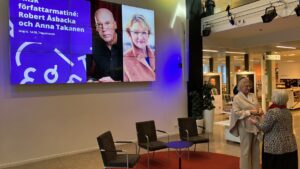The last week of September is always very bookish in Gothenburg. The Gothenburg Book Fair, which was arranged from 28 September to 1 October, has become an institution as part of the cultural offerings in Sweden. For this edition, the theme of the year was the Jewish culture in Sweden, and there were almost 320 seminars and 850 speakers, and 3,464 agenda points in the programme. I was involved in some of them, and was left thinking of the effects and consequences of an interdisciplinary academic profile.
 Even if I’m a media and journalism researcher, my research interests are interdisciplinary and, not the least those of media literacy, cultural criticism and arts journalism, often touch upon issues that are formally located in the literary field. Literature is, however, not my primary field, as I’m more broadly interested in the structures and functional mechanics of cultural fields, also other than literature (above all, fine arts and film). When visiting literary fields I strongly feel at home, while at the same time being aware of the fact that I’m a tourist, or a traveller.
Even if I’m a media and journalism researcher, my research interests are interdisciplinary and, not the least those of media literacy, cultural criticism and arts journalism, often touch upon issues that are formally located in the literary field. Literature is, however, not my primary field, as I’m more broadly interested in the structures and functional mechanics of cultural fields, also other than literature (above all, fine arts and film). When visiting literary fields I strongly feel at home, while at the same time being aware of the fact that I’m a tourist, or a traveller.
At forums such as the book fair, I sometimes find it difficult to define in which role I’m approaching the objects that should be in the centre of discussions. If I’m a media or journalism researcher, I’m not a conventional one, as my research in media literacy, arts journalism, cultural journalism and journalism education all necessitate highly interdisciplinary approaches. My research is, in other words, often not solely located in the core of journalism studies but heavily drawing on other subdisciplines of social sciences such as sociology of arts, as well as media studies, educational sciences and language studies.
Furthermore, as I’m working a lot at the intersection between academy and society, I often find myself at the more overarching levels of cross-sectoral policies, thus cross-reading discourses of the authorities and policymakers rather than those of the practitioners.
 On the other hand, I have a foot deeply in the professional practitioner’s fields, having been – and still being, I do own the press card and have recently acquired more eligibilities for my teacher’s certificate – a journalist, teacher and educator. I understand and endorse the identities of professional practitioners, share the foundation of tacit knowledge with them, and think that theoretizing needs to be somehow grounded in practice.
On the other hand, I have a foot deeply in the professional practitioner’s fields, having been – and still being, I do own the press card and have recently acquired more eligibilities for my teacher’s certificate – a journalist, teacher and educator. I understand and endorse the identities of professional practitioners, share the foundation of tacit knowledge with them, and think that theoretizing needs to be somehow grounded in practice.
In addition, because of my recently aroused interest in second-language learning, multilingualism and minorities, I have during the past years become increasingly deeply engaged with the civil society. Sometimes I’m even expected to speak as a “citizen”, representative of civil society (for example, in the role of a media educating or bilingual parent or member of the national minority), which makes the positioning slightly complex, as I may end up in referring to research or policy documents that I have been involved in writing myself.
It is not only that I experience difficulties in re-framing myself in front of a new discussion partner, but being involved in such many different communities also makes it sometimes confusing for others to place me on a map. The situation may be understood with the help of Etienne Wenger-Trayner and colleagues concept of multimembership management. In their book Learning in landscapes of practice (2015), which is an elaboration of Wenger and Lave’s the concept of community of practice, they suggest that individuals are members of different communities of practice (or discourse communities) simultaneously, and need to negotiate between them when crossing boundaries or dwelling on boundaries. Book fairs are, in other words, excellent forums to exercise such boundary management, using “boundary concepts” to produce “boundary discourses”. I think that this is something that collaborations (the university’s third assignment that we call samverkan in Sweden and YVV, yhteiskunnallinen vuorovaikutus in Finland) is largely about, and “brokering boundary encounters”, as Wenger-Trayner and colleagues call them, should be better analyzed, conceptualized and modelled to make these encounters better understood and teachable.

Be the first to comment on "The Gothenburg Book Fair: Bookish multimembership management"